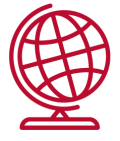Job Resources
"Students graduating with majors and minors in a world language have so many skills that they have developed during their studies in a new language. I often see students not leveraging these skills in interviews and on their resumes. Through the Center for Languages, Literatures and Cultures we offer a workshop in which we explain to students what these skills are and how to talk about them in interviews and how to put them on their resume as more than just a line at the end under ‘languages spoken’."

Maximizing Your World Language Skils
In order to find an ideal job using your world languages, you should build a solid resume that highlights your experiences abroad, your language proficiency, and your appreciation of world cultures. Once you have built your global resume, you can view job postings and other career resources to start you on your way. You should also be prepared to take one of several nationally recognized language proficiency exams if requested by your potential employer.
Your resume is your first encounter with a prospective employer. Carefully preparing your global resume and cover letter can set the stage for an exciting international career.
If you have the benefit of speaking a second or even a third language, you should always mention this in the summary at the beginning of your resume because it is an extremely marketable piece of information. Even if the job itself does not require you to use a language other than English, the knowledge you may have of the other language and its associated culture could be quite valuable to the company.
As you prepare for interviews for position which require language skills, you may be asked to take a language proficiency exam to demonstrate your abilities as they relate to nationally and internationally accepted standards.
There are many sources for language proficiency standards assessment. The following provide widely recognized and reputable standards:
- ACTFL OPI (proficiency in 48 languages)
- Goethe Institute (German proficiency)
- JLPT (Japanese proficiency)
- SOPI (Spanish proficiency)
Certificates that will help you build skills you can add to your resume include:
- The Intercultural Competence for Global Citizenship Certificate
- The Translation and Interpretation Certificate
Please visit the website for the Common European Framework of Reference for Languages (CEFR) to learn more about European standards and levels regarding language learning curriculum and materials.
Where can I search for jobs?
- Websites like Indeed, Monster, and ZipRecruiter are useful if you are searching for international postings by keyword(s) and/or other specified criteria.
- LinkedIn helps you connect with recruiters and allows you to connect with alumni from Ohio State working in career fields you are exploring.
- There are a number of U.S. Government websites to help in a federal job search, such as Partnership for Public Service and USAJOBS. Please consult the U.S. Department of Defense for more information about civilian jobs in the military field.
- Ohio State's College of Engineering has career services available as well.
GoinGlobal

As an Arts and Sciences student, you have free access to thousands of current career opportunities!
To access GoinGlobal, go to Handshake, then click on Career Center > Resources.
GoinGlobal career and employment resources include world-wide job openings, internship listings, industry profiles and country-specific career information. More than 30,000 pages of constantly-updated content is included on topics such as: work permit/visa regulations, resume writing guidelines and examples, employment trends, salary ranges, networking groups, cultural/interviewing advice, corporate profiles and worldwide job listings... plus much more!
